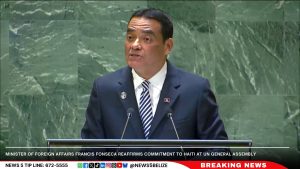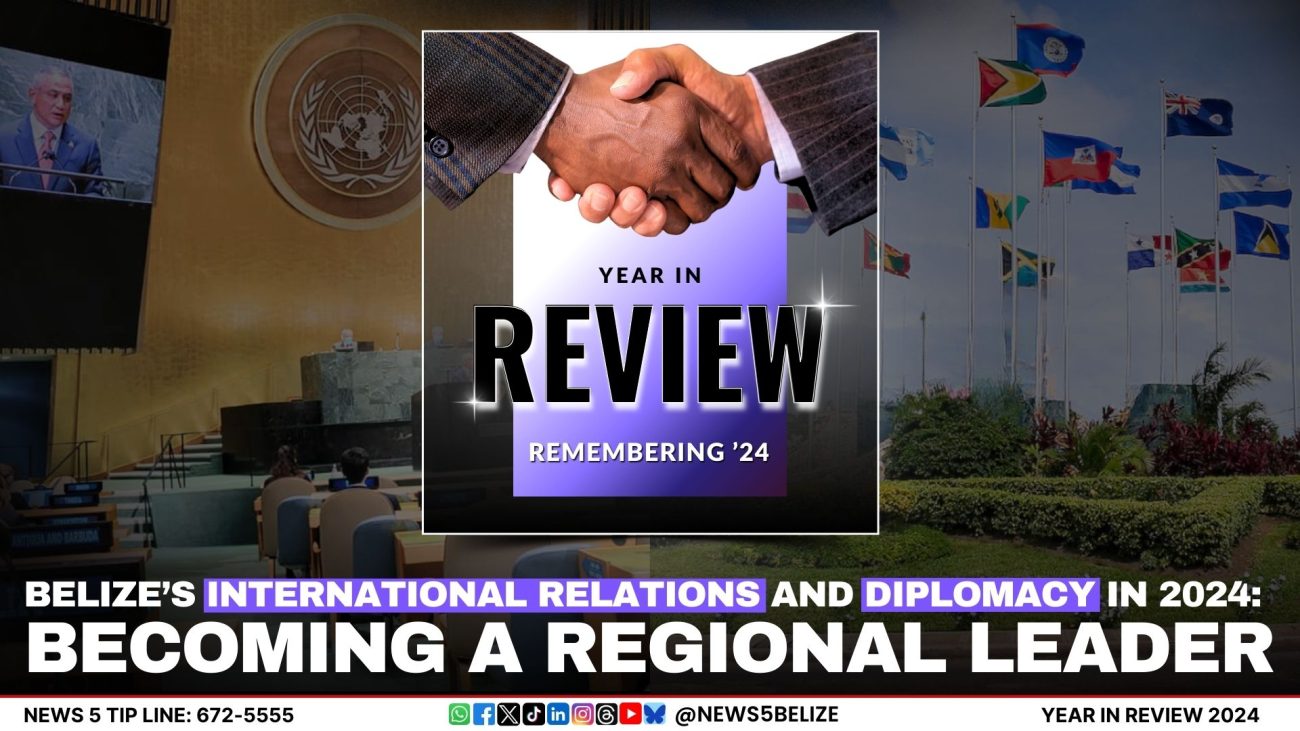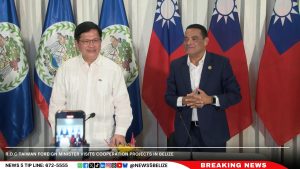Belize’s International Relations and Diplomacy in 2024: Becoming a Regional Leader
As we wrap up 2024, News 5 is excited to bring you our digital Year in Review! This year, we're diving into the highlights and challenges of the past twelve months, all organized by themes. Join us as we look back at the stories that shaped our year…
In 2024, Belize demonstrated a proactive and multifaceted approach to international relations and diplomacy. The country engaged in significant diplomatic activities, strengthened regional and global partnerships, and addressed critical security and humanitarian issues.
Haiti: A Humanitarian Commitment Amidst Lawlessness
Belize played a pivotal role in CARICOM’s efforts to stabilise Haiti, a nation gripped by political instability, economic collapse, and rampant gang violence. The country deployed two senior officers from the Belize Defence Force (BDF) as part of a CARICOM-led mission sanctioned by the United Nations Security Council. The deployment aimed to assess the feasibility of a broader intervention to restore security and facilitate free and fair elections in Haiti.
Prime Minister John Briceño, while addressing threats from Haitian gang leaders, emphasised Belize’s responsibility to its “brothers and sisters” in Haiti. The PM assured that Belize’s involvement would be measured and guided by clear benchmarks, including a ten-point prerequisite plan approved by the Ministry of Defense. “The lawlessness that has overtaken Haiti is tragic,” Briceño remarked, “but we must do our part within CARICOM to help Haiti regain stability.”

However, the mission faced criticism and logistical challenges. Opposition Leader Moses “Shyne” Barrow supported aiding Haiti but expressed concern over Belize’s domestic security, particularly in its maritime territories. This dual perspective reflects a tension between Belize’s regional commitments and its internal priorities.
Haiti’s crisis is marked by the control of armed gangs over Port-au-Prince, widespread violence, and the collapse of essential services. Accounts from Haitians such as Alexandra Pierre painted a grim picture: closed schools and hospitals, food shortages, and pervasive fear. Belize’s response, despite its limited resources, showcased its commitment to regional solidarity and its capacity to engage in humanitarian missions with international support. Training programs involving the BDF and Coast Guard, conducted in collaboration with Canadian and Caribbean counterparts, emphasised readiness for high-risk operations.
Strengthening Regional Security through CARICOM
Belize’s role in CARICOM’s security initiatives extended beyond Haiti. The Exercise Trogon Shield, held in Jamaica, brought together personnel from Belize, The Bahamas, and Jamaica to enhance regional cooperation and preparedness. Belize’s contingent, trained in humanitarian law and operational strategies, demonstrated the country’s dedication to addressing transnational challenges collectively.
Rear Admiral Elton Bennett, Commandant of the Belize Coast Guard, highlighted the rigorous training Belizean personnel underwent, stating, “This is our very best. They are prepared to operate in high-risk environments and contribute to peacekeeping missions under the United Nations umbrella.” Such initiatives underscore Belize’s commitment to bolstering CARICOM’s capacity to address crises.
Strengthening Ties with the United States
Belize’s relationship with the United States remained robust, marked by significant developments in bilateral cooperation. The signing of the Millennium Challenge Corporation (MCC) Compact Grant Agreement was a major milestone, securing $125 million in funding to improve Belize’s education and energy sectors. This agreement, coupled with ongoing security and economic assistance, reinforced the strong partnership between the two nations.

Prime Minister Briceño noted, “Our research has focused on finding sustainable ways to reduce the cost of energy for the people of Belize. Through this grant, we will facilitate new power purchase agreements for low-cost renewable energy, modernise our grid to efficiently manage an influx of various power generation, and support the organisations that oversee our electricity infrastructure.”
High-level visits, including from U.S. officials like Ambassador Uzra Zeya, reaffirmed Belize’s role as a leader in humane migration policies and democratic governance. The U.S. provided substantial support to Belize in areas ranging from border security to economic development, reflecting a partnership anchored in shared values.
Belize’s participation in Central American Integration System (SICA) initiatives further showcased its active role in regional diplomacy. Collaborative projects with Taiwan under SICA emphasised Belize’s strategic positioning as a bridge between the Caribbean and Central America.
Diplomatic Engagements with Mexico
Belize continued to enhance its diplomatic and economic ties with Mexico. Prime Minister Briceño’s visit to Mexico City for the inauguration of President Claudia Sheinbaum highlighted the importance of this relationship. Discussions focused on trade, security, and infrastructure projects, including the potential extension of the Tren Maya project to Belize, which could significantly boost tourism and trade.
Belize’s ambassador to Mexico, Oscar Arnold, shared insights into the historic swearing-in ceremony and the productive meetings held with Mexican officials. The discussions included the possibility of connecting the Tren Maya project to Belize, enhancing transportation and economic opportunities.
A Model of Partnership: Belize and Taiwan
Belize reaffirmed its unwavering support for Taiwan, celebrating 35 years of diplomatic relations. High-level visits and cooperation projects, such as the construction of the San Pedro-Caulker General Hospital funded by Taiwan, demonstrated the strength of this partnership. Belize’s stance on Taiwan remained firm despite regional and international pressures. Taiwan’s foreign minister, Dr. Lin Chai-Lung, visited Belize to announce major projects, including funding for the replacement of the BelCan Bridge and the construction of a $33 million hospital in San Pedro Town.
Prime Minister Briceño said that Belize’s support for Taiwan is unshakeable. Despite domestic debates, including Opposition Leader Shyne Barrow’s critique of Taiwan’s alleged political interference, the partnership remains robust.
Addressing the Israel-Gaza Conflict
Belize maintained a principled position on the Israel-Palestine conflict, advocating for a two-state solution and condemning actions that exacerbated the humanitarian crisis in Gaza. The suspension of diplomatic ties with Israel, following the killing of aid workers in Gaza, underscored Belize’s commitment to human rights and international law. Belize also supported the International Court of Justice’s stance on Israel’s policies in Palestinian territories.
Minister of Foreign Affairs Francis Fonseca reiterated Belize’s position, stating, “For us in Belize, we have always maintained that a two-state solution is the only path to a sustainable, long, permanent, peaceful resolution to this matter.”
Navigating the Sarstoon Dispute with Guatemala
The ongoing territorial dispute with Guatemala remained a critical issue. Belize continued to engage diplomatically with Guatemala, seeking to resolve tensions through the International Court of Justice (ICJ). High-level meetings between Belizean and Guatemalan officials aimed at fostering cooperation and addressing security concerns along the Sarstoon River. The renovated Sarstoon Forward Operating Base (FOB) symbolised Belize’s commitment to sovereignty and its readiness to address illegal activities such as human trafficking and unregulated fishing. The FOB’s strategic importance was underscored during a media visit where Guatemalan Armed Forces attempted to assert claims over the river, highlighting ongoing tensions.
The inauguration of Guatemala’s new president, Bernardo Arevalo, presented an opportunity for renewed dialogue and collaboration.
Prime Minister Briceño expressed optimism about strengthening ties with Guatemala under President Arevalo’s administration, particularly in areas of security and trade. Additionally, Belize’s adherence to international mechanisms, including the Organisation of American States (OAS), showcased its commitment to peaceful conflict resolution.










Facebook Comments